#95: Four Work Questions, Alternative Path Stories, Facebook's Deeper Game & Creativity
😷 Unexpected thoughts on the future of work

May 23rd: Greetings From Las Palmas!
👋 Welcome to all the new subscribers. Since joining Substack, I’ve sent you my thoughts on 59 of the 68 Saturdays. Sitting down to write (and think) each week is something I’ve come to cherish and as I think about the future, writing is always part of it.
While these Saturday thoughts will always remain free, I’ve turned the paid option again and will be experimenting with additional subscriber-only posts such as book reviews, monthly reading suggestions, additional essays on work and creative paths and potentially a serial e-book series. This is a way to raise the stakes for myself to focus my attention on something I want to keep doing.
I’ll share more in the coming months, but if you’d like to come on the ride, feel free to subscribe at the bottom of the post. (all current Patrons have already been added!)
🤔 Four Questions About The State Of Work
The US has lost 38 million jobs. Some of those may come back. Many will not. Going into 2021, the US will likely have the highest unemployment rate in the last 100 years.
I’ve written quite a bit about the fragile labor economy and believe the gaps I’ve written about have become more visible than ever.
Here are the questions I’m thinking about for the next year.
#1 What happens when work doesn’t seem a necessary part of our lives?
In Max Weber’s famous treatise on Capitalism published in the 1800’s, he argued that a central element that enabled capitalism to emerge and succeed starting in the 1500s was the fact that so many people eventually developed a “spirit” for capitalism.
Many people incorrectly equate this spirit as greed, but as Weber points out, greed is timeless and universal not a product of capitalism. It has been seen at all times in history and in all types of economic systems. Instead Weber suggests that capitalism might have become so effective because of its ability to restrain greed:
Capitalism may even be identical with the restraint, or at least a rational tempering, of this irrational impulse.
By channeling this natural human urge into work, it can theoretically benefit not only the greedy person, but society at large.
What then motivates work?
This is where things get tricky and where we might be on a slippery slope regarding our work beliefs.
Weber argues that the Protestant reformation and the shift from people believing work was a necessary evil to one where work was seen as an end in itself was the ultimate shift that unlocked the potential of capitalism to succeed across the world. As he says, “simply: that business with its continuous work has become a necessary part of their lives.”
In the US, this belief is deeply connected with how many measure their success in life:
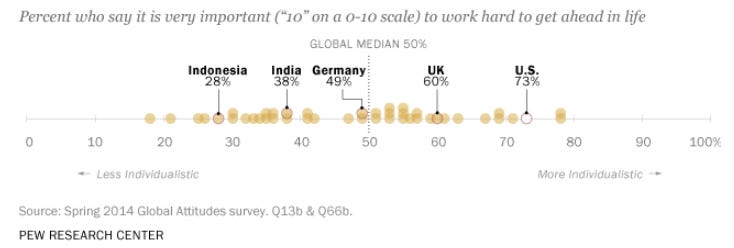
This necessary part of people’s lives has been stripped away and many more are working remotely and questioning if there work is really all that essential at all.
#2: How does unstable work relate to how people think about the future?
To explore this, it's worth taking a trip across the world to Japan, where the economy has been relatively stagnant since the end of the 1980’s boom years.
While Japan has softened some of the blow of this stagnation with a 15% increase in the labor participation rate of women since 2000, it also saw a steady increase “nonregular” work which grew from about 20% of the labor force in the 1990s to almost 40% in the late 2010s.
Many of these people, sometimes called “freeters” opt out of steady paid employment even when it is available. This loss of faith in the prospects of employment has fueled a vicious cycle in Japan. People stopped believing in the future and companies stopped investing in employees.
The result was a self-fulfilling prophecy that made the “non-regular” employment class of workers permanent:
Naoki Shinada, an economist at the Development Bank of Japan, explains that in the immediate aftermath of an economic shock, it makes sense for companies to use temporary and part-time workers to control costs and maintain flexibility. But problems arise when this becomes the standard hiring practice, making it “more difficult for firms to maintain some skills embodied in their labor force.”
People have lacked faith that things will improve in the future and so they take the “non-regular” path.
We’ve already seen these non-regular paths emerge as I explored this in my conversation with Sarah Kessler about her book Gigged.
Will we see a two-tiered labor economy emerge where some have great jobs and others will do various gig work over the course of their lives?
#3 How will the cross-generation disconnect be resolved?
Part of the reason the belief that “if you work hard, you will be taken care of” exists is that it was true. Yet, this has become less and less true:
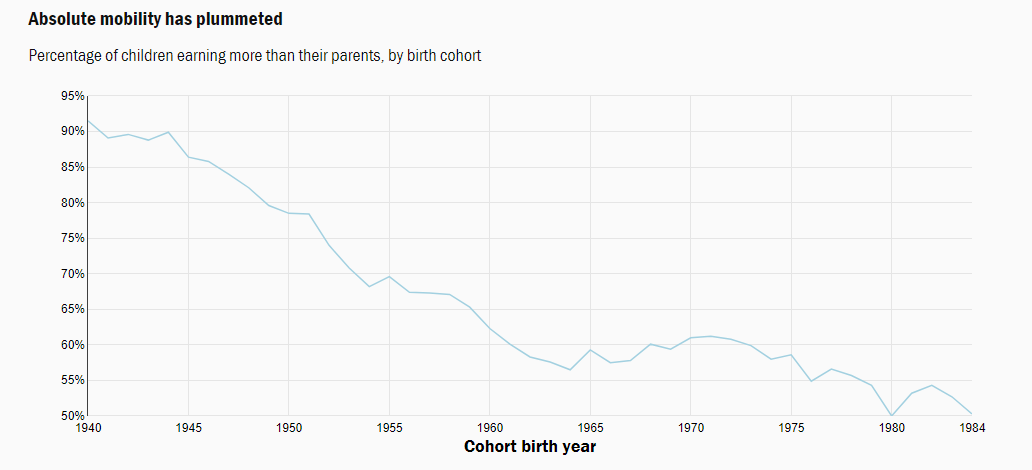
Every ninety out of one hundred people born immediately after World War II ended up earning more than their parents. For millennials, its a coin flip. What will this look like for Gen Z?
This has had a huge effect on household wealth where each generation (except baby boomers) have had less wealth at similar ages:
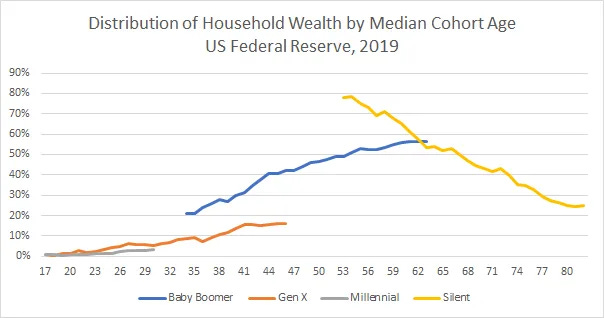
Younger generation have not just sat and mourned the decline of the American dream, they have changed their approach to life. Young people have put more emphasis on experiences over things and have delayed marriage, homeownership and having children:
As a result, the gap between the number of children that women say they want to have (2.7) and the number of children they will probably actually have (1.8) has risen to the highest level in 40 years. (From 1972 to 2016, men have expressed almost exactly the same ideal fertility rates as women: In a given year, they average just 0.04 children below what women say is ideal.)
What further cultural changes will emerge? How will people think about money, where they live and how they spend their time?
One thing that is already happening is a soft wealth transfer from baby boomers to millennials. Consider this:
“in 2000, 23 percent of men aged 21-30 lived with a parent or close relative, but by 2015, that number surged to 35 percent.”
That number is likely going up in the next couple of years.
Many of these parents quietly fund the lives of their kids because lets be honest its a bit embarrassing, especially in a country that believes in work so deeply. Yet this current crisis may be different.
In many western countries, the way to pass wealth down to the next generation was work. That mechanism is not working anymore and has not been working for a while. Will we see new norms emerge? Will boomers embrace a “pre-inheritance” and look to buy a house so their children can start raising their own families or will they continue to believe that work is the only way that people get ahead?
#4 What is the role of making stuff and our relationship to optimism and the future?
Over the past 50 years, there has been a consistent trend of decreasing manufacturing jobs offset by an increase in services jobs.
These new jobs are often positioned as “higher-value” work. While some are many are what Adair Turner has called “zero-sum” work - work that can’t be automated and does not drive productivity gains:
Look around the economy, and it’s striking how much high-talent manpower is devoted to activities that cannot possibly increase human welfare, but entail competition for the available economic pie. Such activities have become ubiquitous: legal services, policing, and prisons; cybercrime and the army of experts defending organizations against it; financial regulators trying to stop mis-selling and the growing ranks of compliance officers employed in response; the huge resources devoted to US election campaigns; real-estate services that facilitate the exchange of already-existing assets; and much financial trading.
Dan Wang has written about the role of this shift in our relationship to optimism about the future:
“Although manufacturing jobs can be wasteful, I don’t think (they have) this issue of being zero-sum.”
The conclusion being that if we just adding more manufacturing jobs we might increase optimism about the future. People have been talking about “bringing back” those jobs for decades - it’s not going to happen.
Silicon Valley is one place that has been dreaming about the future, one with software and robots instead of traditional manufacturing.
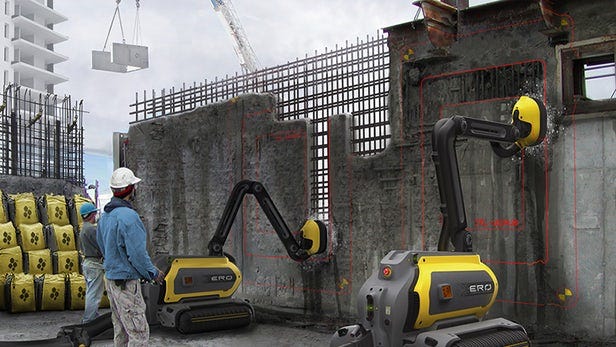
Can people become optimistic about these efforts especially if the robots are doing the building? Or do humans need to use their hands and make stuff?
What questions are arising for you?
👇 Click "like & comment" below and join the conversation 
For the past couple years I’ve been lucky to talk to hundreds of people carving their own paths. I’ve gotten to know many of them over years and it’s always exciting when someone finds themselves on an unexpected journey.
Here is a report from Jeff who left corporate accounting after a couple of years, went to travel the world with his girlfriend and then had to cut it short when the pandemic started. In March he emailed me
📩 March 2020 : “Change of plans has me feeling anxious”
I realized that by traveling I was so removed from the “whats next?” question that once it donned on me that I could be home with no plans in a matter of weeks, my mind started racing.
In one direction, I’m sure I can grind and network my way into a good firm with great pay, but that’s what I did with PwC and I was miserable. I don’t want to make financial models for 85k. So I’m scared of taking a job I’ll feel stuck in and then I’m also scared of trying to earn a living on my own even though that’s what I’d be most excited and proud to be doing. I have plenty of ideas but I’m scared of committing.
It feels like I’m being asked to choose between living completely for the future (good paying job that I’m not crazy about but which will allow me to save for the future) or entirely for the now (starting my own business or taking a smaller paycheck for a company I’m passionate about).
I sent back a short note and told him that at his age, the choice probably wasn’t as all-or-nothing as he imagined and told him that if he bet on himself, something good might happen.
It was surprising then to receive another e-mail this week with such dramatically positive news:
📩 May 2020: “Greetings from the part-time gig collector”
I’m back from the prematurely ended trip, and I’m living in VT with my parents and girlfriend. Working virtually part-time for a marketing company, non-profit, and investing company. I’m LOVING it. All virtual, all great people, picking and choosing how and when I get the work done.
Feeling super motivated and feeling super in control of my own life.
I asked him how he reflected back on his panic earlier in the year:
I felt so much pressure to find what I’m “supposed” to be doing with my life. I felt like I had to make decisions for my future self today.
I started off slowly by working part time for my friend’s aunt’s marketing company. Through that company I worked with a nonprofit that eventually wanted me to come consult 5-10 hours a week for them. Then I had a couple conversations with business owners up here in Vermont and found an accounting firm that was looking for a part time virtual consultant.
It might not be what I do for the rest of my life but it’s giving me the freedom to explore things I’m interested in and I’m genuinely loving all the projects I’m working on.
Now I’m working three virtual gigs and I feel beyond pumped about it. I’m planning hiking trips constantly and golfing mid-week lol. I am getting more done, working less, and feeling happier than any other full time job I’ve worked.
I think this is worth sharing because it is such a common story I hear from people. He’s likely not making the same money he might in accounting, but it sounds like he’s challenged in three directions while also having time with family and for hiking.
I’d bet on people like Jeff in the future.
💻 REMOTE WORK: Facebook’s Deeper Game
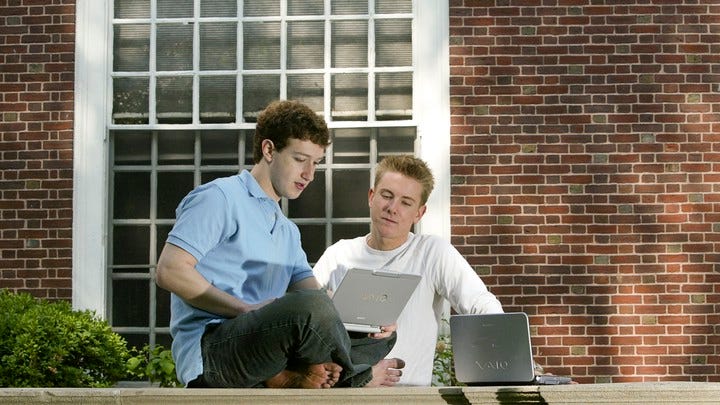
Facebook and Shopify definitely read my newsletter last week and took the “free strategic option” I recommended. The smart companies see that building a capability for remote work is a hard to master skill, but is going to be important in the future.
Zuckerberg even said as much in his announcement:
“We’re going to be the most forward-leaning company on remote work at our scale…
…So, given that people are going to be remote working for a while, I just kind of feel like we have to get good at it. And given that long term, this is a direction that I think we’re going to want to go in more anyway, it just seemed like we should move forward.”
One interesting thing not widely reported from the announcement was that they would be setting up hubs in Denver, Dallas and Atlanta. These three are notable for being low(er)-cost places to live and top destinations for people fleeing NYC and San Francisco. In addition, Zuck said they would boost hiring around hubs in San Diego, Portland, Philadelphia and Pittsburgh.
This is likely in response to the fact that many employees want to move:
An internal company survey found about 45% of employees interested in remote work were “pretty confident” they would move to another location. It also said about 40% of employees said they were somewhat, extremely or very interested in remote work.
The headlines are telling you that this is a shift to working remotely, but it appears to be part of a broader talent and operations strategy. By learning how to work remotely effectively, the company can quickly tap into emerging talent markets while also giving employees more freedom to live their lives.
Traditional companies who decide to return to the office are going to struggle to keep their best employees, especially the ones who might be ready to start a family and want some way to exit an expensive city without giving up the high-wage life.
While many older and more tenured employees want the flexibility, younger college grads do not. The office is often a fun place to be around friends and meet new people. Facebook expects to continue to have offices to use for training, especially for new grads and younger employees:
We’re going to focus on experienced employees rather than new college grads, who I think need to be in the office more, for training.
How is your company handling the remote/office decision?
👇 Click "like & comment" below and join the conversation 🏫 SCHOOLS OUT
Schools are being sued across the country for a refund of part of the tuition. Parents and students are arguing that virtual classes are not worth it. A friend Jeff Noonan, who wrote his senior thesis on the value of higher education, wrote a good article on why schools will probably win the argument (but it may undermine the idea that colleges are for learning). Essentially it goes like this:
Employers pay for completion of the four years, not the learning
The value of the degree is as a signal
People don’t remember what they learn in college
🎨 CREATIVITY
From David Bowie:
“never work for other people, always remember the reason that you initially started working was that there was something inside yourself that you felt that if you could manifest it in some way you would understand more about yourself and how you co-exist with the rest of society”
“If you feel safe in the area you’re working in, you’re not working in the right area”
From Matt Trinetti on creating online:
“Before you serve everyone, you need to serve someone.”
👉 Read

💻 I have an open calendar for curiosity conversations every Wednesday, lets chat
🙋♂️Who is Paul? If you want to learn more about who I am or what I’m working on, find me here, say hi on twitter, or check out some of my longform writing.
If you’d like to become a supported and receive occasional paid posts (more to come!) in addition to the current Saturday newsletter, become a subscriber






